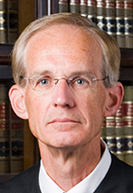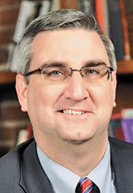Subscriber Benefit
As a subscriber you can listen to articles at work, in the car, or while you work out. Subscribe Now
In what is being called “the right decision,” the Indiana Supreme Court has overturned the law that allowed the Legislature to call itself into a special session. However, the debate over whether the governor should have the exclusive power to convene the General Assembly when the legislators are out of session might not be settled.
The unanimous decision issued June 3 in Eric J. Holcomb, Governor of the State of Indiana v. Rodric Bray, et al. 21S-PL-518, found House Enrolled Act 1123 violated Article 4, Section 9 and Article 3, Section 1 as well as Article 16 of the Indiana Constitution.
The justices emphasized they weren’t making any judgment on the question of whether it is sensible for the Legislature to have the ability to set its emergency sessions. Rather, they determined the General Assembly could not just pass a law giving itself the power to call special sessions but, instead, had to amend the constitution.
“I think this will go down as the most decisive separation of powers case in Indiana legal history,” former Indiana Justice Frank Sullivan said, explaining the 5-0 holding removes any ambiguity and shows the justices clearly saw the law as unconstitutional. He described the opinion written by Chief Justice Loretta Rush as “clear, thorough and persuasive.”

HEA 1123, passed in 2021, was born from the frustration surrounding Gov. Eric Holcomb’s response to the COVID-19 pandemic, which included stay-at-home orders, business closures and mask mandates. The Republican-led Legislature said the bill offered a way to give Hoosiers a voice when a state of emergency is declared.
However, Holcomb said the bill violated the state’s constitution. After the Legislature overrode his veto, he filed a lawsuit in state court.
The Supreme Court held that HEA 1123’s provision allowing the Legislative Council to pass a resolution calling a special session violates Article 4, Section 9’s “fixed by law” language which requires the Legislature pass a law setting the length and frequency of its sessions. Also, the law ran afoul of Article 3, Section 1, which prohibits one branch of government from exercising any of the functions given to another.
“Any session set by the General Assembly must be fixed through a properly enacted bill, not a simple resolution. And thus, when the General Assembly is not in session, it cannot set an additional session,” Rush wrote for the court. “Because HEA-1123 authorizes the Legislative Council to set an emergency session by resolution, the law violates Article 4, Section 9’s fixed-by-law requirement. Further, we agree with the Governor that HEA-1123, by allowing the Legislative Council to set an emergency session while the General Assembly is not in session, violates Article 3, Section 1’s distribution-of-powers mandate and impermissibly circumvents Article 16’s requirements for amending the Constitution.”
Nationwide issue
William Barrett, partner at Williams Barrett & Wilkowski LLP in Greenwood, testified against HEA 1123 while the measure was still being debated in the Statehouse. After the opinion was issued, he said the Supreme Court spoke “with a clear, united voice on an important question of judicial review” and the justices “read the history of the (Indiana) Constitution and read the history of the allocation of authority between (the branches of government) … correctly.”
However, Barrett said the question of what action a governor may take when the legislature is not around is a nationwide issue with which many states are wrestling. In fact, the National Conference of Commissioners on Uniform State Laws, of which he is the chair of the Indiana delegation, is drafting a model act regarding the allocation of authority within a state’s constitutional structure.
Barrett was uncertain if the General Assembly would have any appetite to revisit this issue in the 2023 session but said he will be watching to see what the legislators do.
“I do think the really interesting thing going forward is now that the court has really laid out very clearly where the lane markers are for both (the executive and legislative) branches, what the response will be,” Barrett said. “We hope we’re out of the (pandemic) that drove us into the litigation, but that legal balance of power has yet to be reconciled. I’ll be interested to see who takes the next move when they come back.”
‘Belt and suspenders’
The Supreme Court’s opinion takes a close look at the Indiana Constitution as it was written in 1816 and 1851, along with the 1970 amendment to Article 4, Section 9. The 1851 version gave the governor the special-session authority and the 1970 amendment gave the Legislature the ability to meet every year by requiring the length and frequency of the sessions of the General Assembly be “fixed by law.”
“… The problem with HEA-1123 is not necessarily the what (setting an additional session) but the how (by simple resolution) and the when (outside of a session),” Rush wrote.
Sullivan said the Supreme Court took a “belt and suspenders” approach to the ruling by giving two reasons for why HEA 1123 violates the state’s constitution. After delving into the “fixed by law” language, the opinion provides an “alternative theory” that the law violates Article 3, Section 1’s separation of powers provision.
“(Rush) makes a very strong point of (HEA 1123) violating the fixed by law (requirement),” Sullivan said. “But, I think, that Article 3, Section 1 holding also might say there would be circumstances even if (the legislators) tried to do something by law, they couldn’t interfere with the governor’s exclusive power.”
Former Indiana Senate President Robert Garton first ran for the Legislature in 1970 when the amendment to Article 4, Section 9 appeared on the ballot. He doesn’t remember anyone asking a question about the amendment while he was on the campaign trail which, he speculated, is likely because the voters agreed the Legislature needed to meet annually to handle all its business.
Although he served in the Legislature for 36 years and acknowledges he has a loyalty to the General Assembly, he did not support HEA 1123.
“The (Supreme Court) where it should have been was where the Court ended up because you’re dealing with the constitution here,” Garton said. “… The right decision was made.”
He said the ruling is clear: if the Legislature does want to have the power to call itself into a special session, it must go through the lengthy process of drafting and passing an amendment in two different sessions. Then the provision must be approved by the voters.
Garton doubts that such an amendment would pass at the ballot box. He sees a special-session amendment as leading to a full-time, year-round Legislature, which he does not believe Hoosiers would support.
As to whether a constitutional change also allowing the General Assembly to call special session would create an imbalance of power between the legislative and executive branches, Barrett did not see reason for concern because the change would reflect the will of the citizens.
“The voters will have to answer one way or another, and if they decide to change the balance, well … they’re the ones who create the organic law,” Barrett said.•
Please enable JavaScript to view this content.

